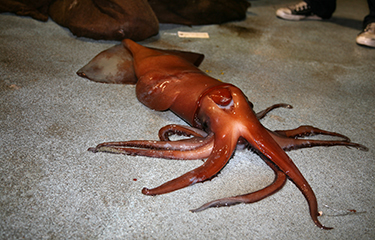The South Pacific Regional Fisheries Management Organization (SPRFMO) is running the risk of being considered non-cooperative in the fight against illegal, unreported, and unregulated (IUU) fishing due to its “lack of strong, consistent binding measures for its members” for the squid fishery, according to a Latin American industry group.
The industry group, the Committee for the Sustainable Management of the Southern Pacific Jumbo Flying Squid (CALAMASUR), was referring to failed talks during the SPRFMO’s 10th annual meeting, which tabled proposals to combat IUU of the threatened Humboldt squid (Dosidicus gigas). The fishery, located off the western coast of South America, is the single most-important squid fishery in the world, accounting for over 30 percent of global squid volumes, according to the U.N.’s Food and Agriculture Organization (FAO).
It is also a fishery that has been victim to IUU fishing, particularly by China’s distant-water fishing fleet, according to the SPRFMO. The number of Chinese-flagged vessels in the south Pacific surged from 54 in 2009 to 707 in 2020, with the squid catch jumping from 70,000 metric tons (MT) to 358,000 MT over the same period, the Associated Press reported. In 2020, a large fleet of mostly Chinese squid-jiggers swarmed international waters near the Galapagos Marine Reserve in Ecuador, a move that environmental activists decried and that Ecuador later responded to by increasing the protected area around the reserve.
SPRFMO considered requiring all vessels under its purview to have onboard observers by 2028, requiring ships to unload their catches solely in ports instead of transshipping at sea to other refrigerated vessels, and new limits on total squid catches. However, the regional fishery management organization did not adopt any of the proposals.
CALAMASUR “deeply regrets that although efforts were made all along this 10th meeting, no substantial improvements have been implemented to ensure conservation and sustainable use of jumbo flying squid… this situation cannot be accepted as an outcome consistent with the strong capacities of the commission,” the Latin American industry group, comprised of industry representatives from Chile, Ecuador, Mexico and Peru, said in a statement.
CALAMASUR participated as an observer in the four-day meeting, which was held virtually due to the COVID-19 pandemic. It said that the virtual format “may have reduced the abilities to reach consensus on these important matters,” but called on members to continue working to ensure strong measures are adopted at the next meeting and to maintain a “precautionary management” so that jumbo flying squid “serves for the long-term benefits to the ecosystem and to the nations that make use of this resource, especially the developing coastal states.”
According to documents submitted to SPRFMO for consideration, all of the fishing of Dosidicus gigas on the high seas of the southeast Pacific was done by Asian countries, with China taking the lion’s share. In 2020 alone, Chinese-flagged vessels caught 358,038 MT of jumbo flying squid, while Taiwan landed 2,087 MT, and South Korea 1,003 MT. Latin American nations also contributed to the total, but fishing only in their exclusive economic zones (EEZ). Peru landed 492,363 MT, followed by Chile at 56,432 MT and Ecuador captured 230 MT.
According to the Associated Press, biologists warn that the focus on Humboldt squid makes the stock vulnerable to overfishing, as has occurred in places such as Argentina, Mexico, and Japan, where stocks have disappeared in the past.
Illegal fishing constitutes the sixth most-lucrative criminal endeavor globally, with estimated annual revenues between USD 15 billion and USD 36 billion (EUR 12.3 billion and EUR 29.6 billion), according to a 2017 report by Global Financial Integrity. International observers have identified the Chinese fishing fleet – estimated at 15,000 vessels by the Overseas Development Institute – as the largest in the world by far, and China is the country with the worst rating for contribution to global illegal fishing in a 2019 Global Initiative report.
In 2021, some of the global squid sector’s biggest players joined forces to fight to prevent products sourced from IUU fishing from entering the market.
With technical support from Sustainable Fisheries Partnership, the Squid IUU Prevention Working Group was formed by companies including Spain’s Congalsa, WOFCO, and Grupo Alfrio; Australia’s Bidfood; the U.K.’s Sea Farms Ltd.; Canada’s Export Packers; and U.S. firms Netuno, The Town Dock, Panapesca, Beaver Street Fisheries, Lund’s Fisheries, Sun Coast Calamari, and Crocker and Winsor Seafoods. The companies promised to address IUU squid fishing through global squid supply chains, seeking to rid domestic and international markets of IUU-tainted squid product.
The SPRFMO has as one of its official goals that it work toward the long-term conservation and sustainable use of the fishery resources in the high seas of the South Pacific Ocean. Its commission currently has 15 members from Asia, Europe, the Americas, and Oceania: Australia, Chile, China, the Cook Islands, Cuba, Ecuador, the European Union, the Faroe Islands (Denmark), New Zealand, Peru, Russia, South Korea, Chinese Taipei, the United States and Vanuatu.
CALAMASUR is comprised of leading industry players - representatives of the artisanal, industrial and processing sectors - from Chile, Ecuador, Mexico and Peru, which are involved in fishing for jumbo flying squid. It has advocated for the jumbo flying squid stock in Pacific waters be sustainability managed according to scientific recommendations, based on rigorous, transparent assessments. The industry group was formed in 2018 and has observer status in the SPRFMO, presenting position statements requesting improvements in science, management, monitor, control, and surveillance.
Photo courtesy of mikeledray/Shutterstock







